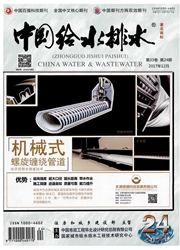

 中文摘要:
中文摘要:
<正>Inactivation and microbial regrowth of penicillin-,ampicillin-,cefalexin-,tetracycline-,chloramphenicol-,and rifampicin-resistant bacteria were studied to explore risks associated with selection and regrowth of antibiotic-resistant bacteria after PAA disinfection.The results showed
 英文摘要:
英文摘要:
Inactivation and microbial regrowth of penicillin-, ampicillin-, cefalexin-, tetracycline-, chloramphenicol-, and rifampicin-resistant bacteria were studied to explore risks associated with selection and regrowth of antibiotic-resistant bacteria after PAA disinfection. The results showed that after exposure to 20 mg/L PAA for 10 min, inactivation of ampicillin-resistant bacteria reached 2.3-1og, which was significantly higher than that of total heterotrophic bacteria with a decrease of 2.0-log. In contrast, inactivation of tetracycline- resistant bacteria was significantly less efficient, reaching only 1.1-1og. Chloramphenicol-and tetracycline-resistant bacteria, as well as total heterotrophic bacteria regrew more than 10 fold compared to those in the untreated wastewater sample with 22 h stilling culture after exposure to 2 or 5 mg/L PAA as for 10 min.
 同期刊论文项目
同期刊论文项目
 同项目期刊论文
同项目期刊论文
 Monitoring and evaluation of antibiotic-resistant bacteria at a municipal wastewater treatment plant
Monitoring and evaluation of antibiotic-resistant bacteria at a municipal wastewater treatment plant Effect of chlorination and ultraviolet disinfection on tetA-mediated tetracycline resistance of Esch
Effect of chlorination and ultraviolet disinfection on tetA-mediated tetracycline resistance of Esch Inactivation and Regrowth of Antibiotic-resistant Bacteria by PAA Disinfection in the Secondary Effl
Inactivation and Regrowth of Antibiotic-resistant Bacteria by PAA Disinfection in the Secondary Effl 期刊信息
期刊信息
